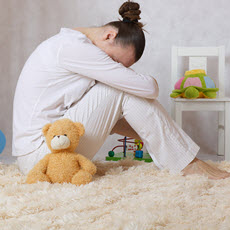
Postpartum Health and Depression
Good postpartum health is as important as prenatal care. After your baby is born, it may seem impossible to do anything other than eat, sleep, and care for your baby and that's okay. Get as much rest as possible and know that you may still have cramps or swollen legs and feet. Look for signs that you may be experiencing postpartum depression, such as lingering feelings of sadness or anxiety.
Postpartum Depression
Also called: Post-pregnancy depression
MEDICAL ENCYCLOPEDIA
National Institutes of Health
Other Languages
Many women have the baby blues after childbirth. If you have the baby blues, you may have mood swings, feel sad, anxious or overwhelmed, have crying spells, lose your appetite, or have trouble sleeping. The baby blues most often go away within a few days or a week. The symptoms are not severe and do not need treatment.
The symptoms of postpartum depression last longer and are more severe. You may also feel hopeless and worthless, and lose interest in the baby. You may have thoughts of hurting yourself or the baby. Very rarely, new mothers develop something even more serious. They may have hallucinations or try to hurt themselves or the baby. They need to get treatment right away, often in the hospital.
Postpartum depression can begin anytime within the first year after childbirth. The cause is not known. Hormonal and physical changes after birth and the stress of caring for a new baby may play a role. Women who have had depression are at higher risk.
If you think you have postpartum depression, tell your health care provider. Medicines, including antidepressants and talk therapy can help you get well.
Dept. of Health and Human Services Office on Women's Health
- Postpartum Depression Screening
 (National Library of Medicine)Also in Spanish
(National Library of Medicine)Also in Spanish
- Antidepressants: MedlinePlus Health Topic
 (National Library of Medicine)Also in Spanish
(National Library of Medicine)Also in Spanish - Depression Treatment (Centers for Disease Control and Prevention)
- Psychotherapies
 (National Institute of Mental Health)
(National Institute of Mental Health)
- Tips for Postpartum Dads and Partners (Postpartum Support International)
- Understanding Motherhood and Mood - Baby Blues and Beyond (American Academy of Pediatrics)Also in Spanish
- Anxiety During Pregnancy and Postpartum (Postpartum Support International)
- Postpartum Post-Traumatic Stress Disorder (Postpartum Support International)
- Postpartum Psychosis (Postpartum Support International)
- Postpartum Blues (March of Dimes Birth Defects Foundation)
- ClinicalTrials.gov: Depression, Postpartum
 (National Institutes of Health)
(National Institutes of Health)
- Article: The Relationship Between Vitamin D and Postpartum Depression in Reproductive-Aged Iranian...
- Article: Predictors of psychological distress in low-income mothers over the first postpartum...
- Article: Physical discomfort in early pregnancy and postpartum depressive symptoms.
- Postpartum Depression -- see more articles
- Behavioral Health and Substance Abuse Treatment Services Locator(Substance Abuse and Mental Health Services Administration)
- National Institute of Mental Health

- Postpartum Psychosis Help (Postpartum Support International)
- Postpartum depression (Medical Encyclopedia)Also in Spanish





















.png)












No hay comentarios:
Publicar un comentario